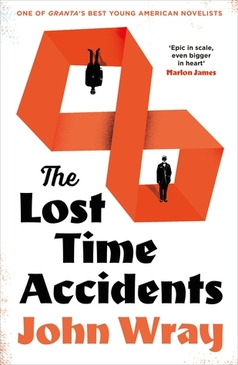| This morning, at 08:47 EST, I woke up to find myself excused from time. I can picture you perfectly, reading this letter. You’ll be telling yourself I’ve gone stupid with grief, or that I’ve lost my mind—but my thinking has never been clearer. Believe me, Mrs Haven, when I tell you that this is no joke. Time moves freely about me, gurgling like a whirlpool, fluxing like a quantum field, spinning like a galaxy around its focal hub—at the hub, however, everything is quiet. |
If that sounds confusing, it is! But The Lost Time Accidents is also an intriguing family saga set against 20th-century history which addresses the boundary between science and dogma, between obsession and madness, and between various forms of faith. Like Nikita Slavkin in The Vanishing Futurist, Ottakar’s sons come to question chronology around the same time as Einstein, but the latter’s beating him to publication drives Uncle Waldemar out of his mind. As in The Gap of Time, the swirl of ideas about time are fascinating, but for me the psychological aspect of the myths perpetuated across generations was the more compelling.
The young Waldemar wonders how he’s “managed to be born into a family that approached science the way a witch doctor approaches medicine” (p312). I found part of the answer (reinforced by a later reference to the biblical story of Abraham and Isaac, p350) in the Oedipal struggles of Ottakar’s sons (p115):
confronted with his long-lost brother’s fidelity to the grail of their youth, Kaspar found himself wondering whether his commitment to reason, to objectivity, and to the scientific method—his commitment to society, in other words—might not, at bottom, be an act of treason.
Unfortunately, it’s not unusual for children to have to choose between sanity and loyalty to their parents – see Her Father’s Daughter, Hope Farm and The Offering for other novels addressing this issue.
The Lost Time Accidents is published by Canongate to whom thanks for my review copy. Now for some more general reflections triggered by my reading of this novel.
You don’t read a novel about time without thinking about how we can bend, speed up or slow time in fiction. In writing my own novel with a secret at the heart, I wanted to circle around time, revisiting events from my character’s past from a different perspective as her secret became known.
Those who are following Irene Waters’ Times Past memoir project might, like me, have speculated on the possible meanings of Waldemar’s aunts’ Archive, given that this month’s prompt is collections. It might be a defensive response to my own hoarding propensities, but I haven’t found it easy to connect with my own childhood collections. Yes, I had stamp albums, and sent off postal orders for those with pretty pictures that seemed designed more for collectors than for sending things through the post. I also had a fine collection of enamel badges and pottery models of now discredited figures that were emblematic of a certain brand of marmalade. And I was a sucker for those schemes where you save up vouchers and/or points to exchange for some piece of tat from a catalogue (and wonder what impact the gum from Green Shield stamps has had on my intestines). For other fictional collections, see my reviews of The Song Collector, The Museum of Things Left Behind and Zoo.
I’m always intrigued to come across an explicit reference to psychological research in a novel especially if, as in this case, it’s in connection with some obscure topic I’d not encountered for years. With so much else going on, I imagine most readers wouldn’t take much notice of the sentence tucked away on p116:
Subjects tested in a room with a mirror have been found to work harder, to be more helpful and to be less inclined to cheat, compared with control groups performing the same exercises in non-mirrored settings.
But it took me back to my student days studying the impact of “self-awareness” on depressed mood. The studies I drew upon in those pre-internet days don’t show up in a quick search (although I found this on food consumption of interest) – perhaps I need to go back in time for another look.






















 RSS Feed
RSS Feed





















